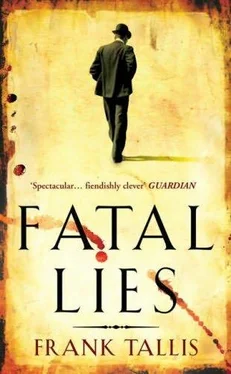Frank Tallis - Fatal Lies
Здесь есть возможность читать онлайн «Frank Tallis - Fatal Lies» весь текст электронной книги совершенно бесплатно (целиком полную версию без сокращений). В некоторых случаях можно слушать аудио, скачать через торрент в формате fb2 и присутствует краткое содержание. Жанр: Исторический детектив, на английском языке. Описание произведения, (предисловие) а так же отзывы посетителей доступны на портале библиотеки ЛибКат.
- Название:Fatal Lies
- Автор:
- Жанр:
- Год:неизвестен
- ISBN:нет данных
- Рейтинг книги:3 / 5. Голосов: 1
-
Избранное:Добавить в избранное
- Отзывы:
-
Ваша оценка:
- 60
- 1
- 2
- 3
- 4
- 5
Fatal Lies: краткое содержание, описание и аннотация
Предлагаем к чтению аннотацию, описание, краткое содержание или предисловие (зависит от того, что написал сам автор книги «Fatal Lies»). Если вы не нашли необходимую информацию о книге — напишите в комментариях, мы постараемся отыскать её.
Fatal Lies — читать онлайн бесплатно полную книгу (весь текст) целиком
Ниже представлен текст книги, разбитый по страницам. Система сохранения места последней прочитанной страницы, позволяет с удобством читать онлайн бесплатно книгу «Fatal Lies», без необходимости каждый раз заново искать на чём Вы остановились. Поставьте закладку, и сможете в любой момент перейти на страницу, на которой закончили чтение.
Интервал:
Закладка:
“Good morning,” said Rheinhardt.
The boys halted, bowed, clicked their heels-and proceeded in the same tight and disconcertingly silent formation.
Albert ascended yet another staircase-this time wider-and escorted Rheinhardt to a musty, remote corner of the building where a row of half-open doors created wedges of ghostly light among the shadows. The “treasury smell” was particularly strong, having matured, like a piece of ripe cheese, in the undisturbed air.
“You can use any of these, sir,” said the old man, struggling to catch his breath.
The classrooms were strangely melancholy: abandoned desks, a waste bin on its side, scattered paper, and a blackboard on which algebraic symbols constituted only half of an incomplete equation. Rheinhardt selected the least cluttered interior and asked Albert to fetch the first master on his list.
Lieutenant Osterhagen was a tall broad-shouldered man with ruggedly handsome features. His blond hair was cropped short, and a deep cleft was visible in the middle of his clean-shaven chin. Remarkably (for a gymnastics master) he walked with a limp. When he sat down, with evident discomfort, he made a passing reference to the “old Transylvanian complaint.”
“Transylvanian complaint?” asked Rheinhardt.
“Nationalists,” said Osterhagen. “I took one of their bullets when my regiment was sent to deal with a situation — if you know what I mean?”
Rheinhardt wasn't sure that he did know what the lieutenant meant. Nevertheless, he thought it wise to nod politely and proceed with the interview.
“I'm not surprised he dropped dead,” said Osterhagen. “It was obvious there was something wrong with him.”
“Why do you say that?”
“He was never well… always suffering from colds, always wrapped up in a scarf and wearing gloves, always clutching an exemption certificate from the infirmary.”
“He wasn't, then, in your opinion, a very strong boy?”
The lieutenant laughed with savage contempt.
“Good God, no. Whatever gave you that idea?”
“I was told that he used to help his father-lifting heavy crates in a warehouse.”
“He might have swept the floor, perhaps,” said Osterhagen, twisting his mouth to one side in a sarcastic grin. When the inspector did not smile back, Osterhagen added with indifference, “The boy was destined for a career in the civil service. Not the army.”
Osterhagen typified a certain type of military man. Blustering, bombastic, and appallingly insensitive. When the interview ended, Rheinhardt was relieved to bid the lieutenant good day.
The next two masters had very little to say about Zelenka. Neither of them had known him very well. Indeed, one of them, Dr. Kloester, confused Zelenka with another Czech boy called Cervenka. Consequently, Rheinhardt had to cross out all Kloester's answers and start the interview again.
Herr Lang-the drawing and calligraphy master-was a more promising informant.
“I was in my rooms when I heard. The headmaster came to the lodges on Saturday morning to tell us all personally. I couldn't believe it… such a terrible tragedy. Do you know what happened, Inspector? Do you know how Zelenka died?”
Rheinhardt shook his head.
Lang was in his late twenties. His hair was parted at the side and drawn in thick wavy strands across his head. A wildly undulating forelock occasionally fell forward and had to be pushed back again. His nose was long and straight, and his large, implacable eyes were arresting. The ensemble, however, was mitigated by the lower half of his face, which comprised a thin mustache, an incongruously tight mouth, and a soft, rounded chin. It was these weaker elements, however, that imbued his expressions with an unusual degree of humanity. He was dressed in a navy jacket, the lapels and cuffs of which were decorated with parallel lines of yellow stitching, and pale blue trousers with a prominent pinstripe. His cravat was green and matched a silk handkerchief that burst, rather too abundantly, from his breast pocket.
“He wasn't a talented artist,” Lang continued, “but he was an intelligent, attentive boy. I remember showing him some illustrations in Ver Sacrum, the periodical of the Secession. He asked me some very astute questions about the artist's purpose-questions concerning symbolism and meaning. I was impressed. One wouldn't have got that kind of response-a mature response-from his comrades. They would simply have smirked and made lewd remarks.”
“Why would they do that?”
“Nudity. Even a line drawing of the female form…” Lang's sentence trailed off in exasperation.
“I see,” said Rheinhardt, inwardly reflecting that the minds of schoolboys had not changed very much since his own youth.
“Zelenka was different,” said Lang. “Very self-possessed for his age. A little shy, perhaps, but he was growing out of it. I was very fond of him.”
The young master blinked rapidly, and Rheinhardt wondered if he was about to cry.
“Was he happy here, do you think?”
Lang changed position and made a plosive sound that managed to combine incredulity with indignation. His features hardened.
“He was a scholarship boy.”
“What of it?”
“I don't think anybody from his background could possibly be happy in a place like Saint Florian's!”
Rheinhardt allowed the subsequent silence to build until Lang felt compelled to justify his expostulation. “Historically, Saint Florian's has always welcomed boys from a particular kind of family. The headmaster doesn't agree with the new egalitarianism that the emperor is trying to promote in our schools and universities.”
“Are you suggesting that boys like Zelenka, boys from poor backgrounds, are treated badly?”
Lang got up from his chair and walked to the door. He opened it a fraction and looked through the crack. The sound of Albert's stertorous breathing could be heard outside. Satisfied that there were no eavesdroppers, he closed the door quietly and returned to the table. He did not sit down.
“Look, Inspector.” He appeared slightly agitated. “I know that for boys like Zelenka this school is purgatory. I talk to them while they're drawing. I can see it in their eyes-the sadness, the fear. And sometimes they say things.”
“What do you mean, ‘say things?’ “
“I've been to see the headmaster, but, between you and me, Professor Eichmann is only interested in the welfare of boys from good families. As for the rest…”
“Have you considered discussing your concerns with the board of governors?”
“I have… but I won't now. It's too late.”
“Why?”
“Because I'm leaving. I intend to hand in my resignation at the end of term.”
“Do you have another position to go to?”
“No. I intend to join the Secessionists. You will, I trust, treat what I have said- all that I have said-as strictly confidential?”
“Yes, of course.”
It was evident from their further discussion that Lang was, and had always been, unhappy at Saint Florian's. He did not enjoy the company of his colleagues, and he found the general atmosphere intolerably oppressive.
“Do you know Isidor Perger?” asked Rheinhardt.
“Yes, he's another scholarship boy.”
“I was hoping to interview him this afternoon.”
Lang's mouth twisted into a sardonic smile.
“You won't get much out of him.” Lang glanced at his watch and edged toward the door. “If you'll excuse me, Inspector, I have a class.”
Rheinhardt thanked Lang for his assistance, made a few notes, and walked over to the windows. Peering out of the central lancet, he saw some terraced brick houses (perhaps the “lodges” that Eichmann and Lang had referred to), a stable, and an equestrian enclosure-the outer edge of which was being circumambulated by a troop of boys on horseback. His gaze was drawn upward, toward the fir-covered hills that rolled out into the milky distance.
Читать дальшеИнтервал:
Закладка:
Похожие книги на «Fatal Lies»
Представляем Вашему вниманию похожие книги на «Fatal Lies» списком для выбора. Мы отобрали схожую по названию и смыслу литературу в надежде предоставить читателям больше вариантов отыскать новые, интересные, ещё непрочитанные произведения.
Обсуждение, отзывы о книге «Fatal Lies» и просто собственные мнения читателей. Оставьте ваши комментарии, напишите, что Вы думаете о произведении, его смысле или главных героях. Укажите что конкретно понравилось, а что нет, и почему Вы так считаете.












